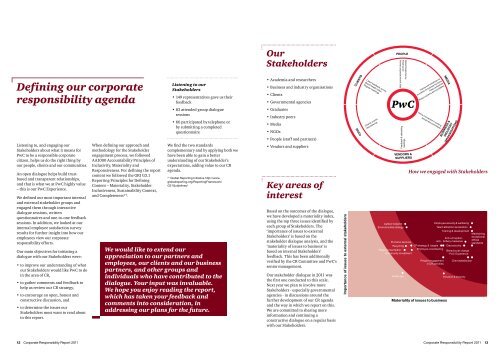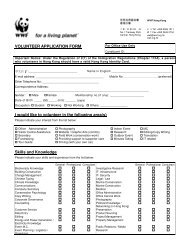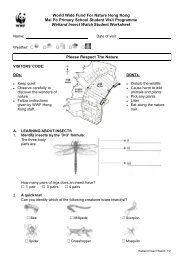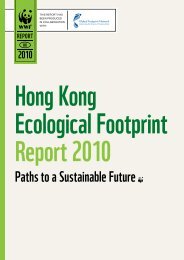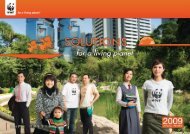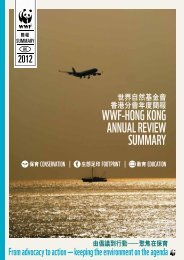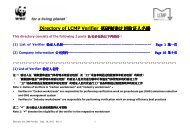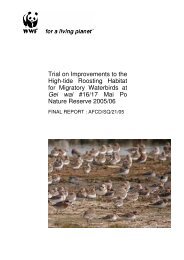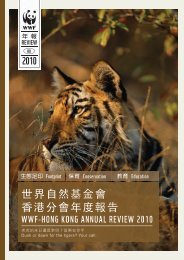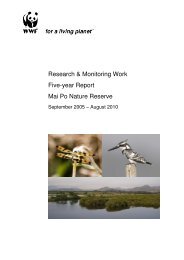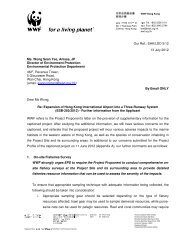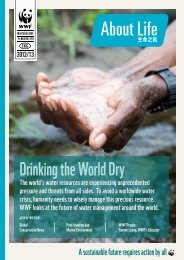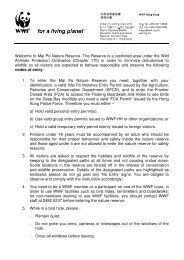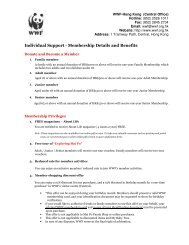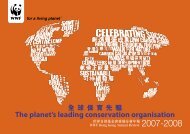PwC - WWF
PwC - WWF
PwC - WWF
Create successful ePaper yourself
Turn your PDF publications into a flip-book with our unique Google optimized e-Paper software.
Defining our corporate<br />
responsibility agenda<br />
Listening to, and engaging our<br />
Stakeholders about what it means for<br />
<strong>PwC</strong> to be a responsible corporate<br />
citizen, helps us do the right thing by<br />
our people, clients and our communities.<br />
An open dialogue helps build trustbased<br />
and transparent relationships,<br />
and that is what we at <strong>PwC</strong> highly value<br />
– this is our <strong>PwC</strong> Experience.<br />
We defined our most important internal<br />
and external stakeholder groups and<br />
engaged them through interactive<br />
dialogue sessions, written<br />
questionnaires and one-to-one feedback<br />
sessions. In addition, we looked at our<br />
internal employee satisfaction survey<br />
results for further insight into how our<br />
employees view our corporate<br />
responsibility efforts.<br />
Our main objectives for initiating a<br />
dialogue with our Stakeholders were:<br />
• to improve our understanding of what<br />
our Stakeholders would like <strong>PwC</strong> to do<br />
in the area of CR,<br />
• to gather comments and feedback to<br />
help us review our CR strategy,<br />
• to encourage an open, honest and<br />
constructive discussion, and<br />
• to determine the issues our<br />
Stakeholders most want to read about<br />
in this report.<br />
When defining our approach and<br />
methodology for the Stakeholder<br />
engagement process, we followed<br />
AA1000 Accountability Principles of<br />
Inclusivity, Materiality and<br />
Responsiveness. For defining the report<br />
content we followed the GRI G3.1<br />
Reporting Principles for Defining<br />
Content – Materiality, Stakeholder<br />
Inclusiveness, Sustainability Context,<br />
and Completeness**.<br />
Listening to our<br />
Stakeholders<br />
• 149 representatives gave us their<br />
feedback<br />
• 83 attended group dialogue<br />
sessions<br />
• 66 participated by telephone or<br />
by submitting a completed<br />
questionnaire<br />
We find the two standards<br />
complementary and by applying both we<br />
have been able to gain a better<br />
understanding of our Stakeholder’s<br />
expectations, adding value to our CR<br />
agenda.<br />
** Global Reporting Initiative http://www.<br />
globalreporting.org/ReportingFramework/<br />
G31Guidelines/<br />
We would like to extend our<br />
appreciation to our partners and<br />
employees, our clients and our business<br />
partners, and other groups and<br />
individuals who have contributed to the<br />
dialogue. Your input was invaluable.<br />
We hope you enjoy reading the report,<br />
which has taken your feedback and<br />
comments into consideration, in<br />
addressing our plans for the future.<br />
Our<br />
Stakeholders<br />
• Academia and researchers<br />
• Business and industry organisations<br />
• Clients<br />
• Governmental agencies<br />
• Graduates<br />
• Industry peers<br />
• Media<br />
• NGOs<br />
• People (staff and partners)<br />
• Vendors and suppliers<br />
Key areas of<br />
interest<br />
Based on the outcomes of the dialogue,<br />
we have developed a materiality index,<br />
using the top three issues identified by<br />
each group of Stakeholders. The<br />
‘importance of issues to external<br />
Stakeholders’ is based on the<br />
stakeholder dialogue analysis, and the<br />
‘materiality of issues to business’ is<br />
based on internal Stakeholders’<br />
feedback. This has been additionally<br />
verified by the CR Committee and <strong>PwC</strong>’s<br />
senior management.<br />
Our stakeholder dialogue in 2011 was<br />
the first one conducted to this scale.<br />
Next year we plan to involve more<br />
Stakeholders - especially governmental<br />
agencies - in discussions around the<br />
further development of our CR agenda<br />
and the way in which we report on this.<br />
We are committed to sharing more<br />
information and continuing a<br />
constructive dialogue on a regular basis<br />
with our Stakeholders.<br />
Importance of issues to external stakeholders<br />
CLIENTS<br />
NGOs<br />
Client feedback survey<br />
Brand health index<br />
Regular meetings<br />
Charity events<br />
Volunteering<br />
PEOPLE<br />
Global People Survey<br />
Pulse survey<br />
Internal corporate intranet (rise)<br />
<strong>PwC</strong><br />
Feedback & debriefing<br />
meetings<br />
Carbon footprint<br />
Environmental strategy<br />
VENDORS &<br />
SUPPLIERS<br />
Pro bono services<br />
Recycling<br />
Paper consumption<br />
Community investment<br />
Water use<br />
Active involvement in working<br />
groups and committees<br />
MEDIA<br />
Training and workshops for<br />
journalists on business hot topics<br />
Press conferences<br />
Media luncheons and roundtables<br />
BUSINESS &<br />
INDUSTRY<br />
ORGANISATIONS<br />
How we engaged with Stakeholders<br />
CR strategy & targets<br />
Employee volunteering<br />
People engagement<br />
in CR activities<br />
Materiality of issues to business<br />
Employee security & wellbeing<br />
Talent attraction & retention<br />
Training & development<br />
Anti-corruption,<br />
anti - bribery measures<br />
Data security<br />
Behavioural change<br />
- <strong>PwC</strong> Experience<br />
Client satisfaction<br />
Inclusion & diversity<br />
Maintaining<br />
exceptional<br />
ethical<br />
standards<br />
12 Corporate Responsibility Report 2011<br />
Corporate Responsibility Report 2011 13


